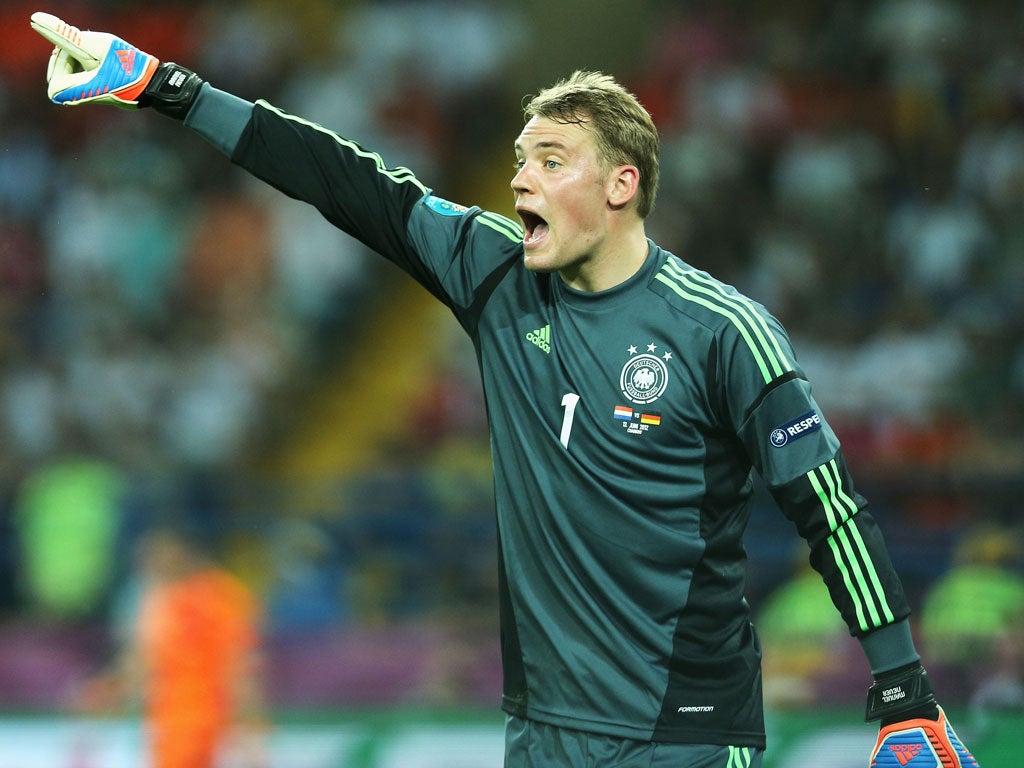James Lawton: No air-punching, no Mourinho dance – an iron fist for Low

There are only some very hard places for the Dutch, the fourth-ranked nation in the world, to turn now. Each one of them tells a story of failure to exploit some quite beautiful talent when it is given the kind of test presented by their bitter but brilliantly accomplished and so often nerveless rivals Germany.
Robin van Persie, who came here as one of the game's most desired strikers, could only half-redeem another brace of missed chances and at the end it was as we have come to expect of a team with a genius for self-betrayal.
It left the Netherlands pointless and profoundly frustrated, and yet showing deep signs of civil war when Arjen Robben, the most gifted of their current generation, reacted to his replacement near the end by vaulting over an advertising board and stomping away. Barring some mathematical improbability in the final group games it was the final, crushing evidence of another Dutch misadventure.
But then how very German football it was at the start to stand around like only half-interested artisans while the Dutch once again took hold of a game with their fluent, sometimes even mesmerising, passing – and then produce a goal of such authority and resonance, such dismissal, you could have set it to Beethoven.
They do it all the time, of course – they did in 1954 against the Hungarians, who some thought were possibly the best international team the game had ever seen. They did it to the Dutch of Johan Cruyff in another World Cup final 20 years later and, after eviscerating England and Argentina in South Africa two years ago, they brought the routine bang up to date in the sweltering heat of the Ukrainian night.
When Mario Gomez scored the second of the two goals that landed on the Netherlands like a massive one-two combination of a left hook and a right cross, the German coach Joachim Low stepped forward at the touch-line and made a gesture entirely consistent with some of his recent pronouncements.
He didn't punch the air or do a Mourinho dance. He slowly closed his right fist – it was not so much a statement of triumph as certainty, and it reminded you why Germany stand behind only Brazil in the frequency of their appearances at the top of the game.
They just keep remaking themselves and always with the same basic ingredient. It is not always the highest skill, though the Gomez strikes that destroyed the Dutch last night would have graced any top-notch company. It is a relentless way of playing and thinking, and it is always getting strong again at places which, if not broken, may have developed some weakness.
Gomez happened to be the enforcer on this occasion, but from the moment he scored his first in the 24th minute it was as though the entire team had simply moved on to another level.
Bastian Schweinsteiger, below, Thomas Muller and Mesut Ozil were most conspicuous in supporting the front man as he turned the Orange defence into something that so quickly began to look like tomato puree.
On both occasions it was Schweinsteiger, such a forlorn figure when Bayern Munich were beaten in the Champions League final, who fed Gomez. With the first, the Dutch fancied they had lured the striker into their offside trap but his timing, and almost delicate little turn, were masterful.
For the second, the Netherlands' young full-back, Jetro Willems, must have felt a little as though he had been caught up in the workings of a combine harvester. For a little while both he and his team-mates were simply crushed.
What could they do? It was simply to play as they have been doing for so long, passing and running – and Robben, especially, seemed reluctant to be shunted into the sidelines by a team with a better understanding of what it takes to win football games at the highest level.
Wesley Sneijder also seemed to find a new level of determination and, if the Germans were playing some lordly football, the nerve of the Dutch on this occasion was, plainly, not finally shot. Indeed, there was, when you considered all that had gone before, an amazing amount of it on call. Sneijder required Jerome Boateng to make a point-blank stop but there was simply no resistance to the superb strike of Van Persie in the 73rd minute. Suddenly, and rather staggeringly, the Dutch were alive again.
This was partly because the Dutch coach, Bert van Maarwijk, found some of his own nerve when he turned to the neglected creativity of Rafael van der Vaart and the goal instinct of Klass-Jan Huntelaar. Earlier he had talked of his team's "positive tension". Ultimately, it just wasn't positive or steely enough.
Subscribe to Independent Premium to bookmark this article
Want to bookmark your favourite articles and stories to read or reference later? Start your Independent Premium subscription today.

Join our commenting forum
Join thought-provoking conversations, follow other Independent readers and see their replies